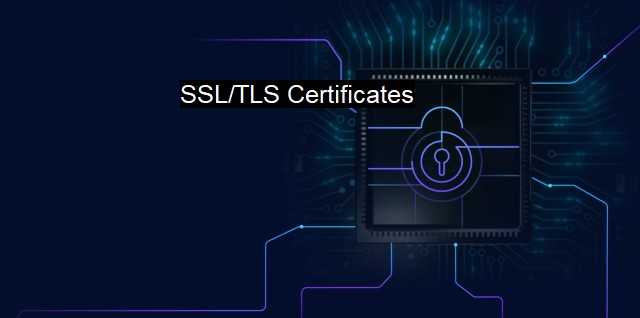What are SSL/TLS Certificates?
Protecting Your Business from Cyber Threats: Understanding SSL/TLS Certificates and their Importance for Secure Communication Online
SSL/TLS Certificates are essential tools in the sphere of cybersecurity and antivirus. The acronyms SSL and TLS stand for Secure Sockets Layer and Transport Layer Security respectively. They assume a prominent role in maintaining confidentiality, integrity, and authenticity of data while it is being transmitted across the networks.SSL was the first protocol to be developed and applied to secure HTTP connections between servers and clients. bred with several vulnerabilities and limitations, a new and improved version of the SSL, that is, TLS was introduced, which is the default encryption protocol applied these days.
In the universe of the internet, communication over networks between different systems needs to be safeguarded. This includes protecting data in transit over the network from unsolicited breaches, attacks, and unauthorized alterations to the shared data. SSL/TLS Certificates kick into action in this regard as they are part of security protocols used to protect data over the network.
SSL/TLS Certificates initiate encryption of data once the servers and clients are in agreement and set to send and receive data. The procedure in which this interaction takes place comprises several steps including the process of 'handshaking'. During this, the client and server authenticate each other by establishing a series of trust decisions backed up by the SSL/TLS certificates.
The SSL/TLS Certificates are thus associated with binding an identity to a pair of electronic keys that can be used to encrypt and sign digital information, commonly known as Public Key Infrastructure (PKI). They encompass an array of information. For instance, they cite the name of the holder, a serial number, expiration dates, a copy of the certificate holder's public key (used for encrypting messages and digital signatures), and the digital signature of the certificate-issuing authority, confirming that the certificate has not been self-signed which is done to ensure reliability.
Also, these certificates have different types such as Domain validation, Organisation validation, and Extended validation certificates, offering different assurance levels. Depending on the context of cybersecurity needs and confidentiality of data, these certificates could be obtained. Meanwhile, they also widely differ in cost structure, meaning more rigorous validation and broader warranties correlate with bigger budget needs.
In the antivirus context, SSL/TLS certificates play a highly instrumental role. By managing a safe channel for data transmission, they automatically do half the work of an antivirus software – protecting the data from being fallen into wrong hands and misused maliciously. But remember, an intact SSL/TLS certificate is only applicable to safeguard in-transit data, not on the stored data; that's when we need to deploy further antivirus and anti-malware solutions.
Summarily, the SSL/TLS certificates hold great importance in today's cyberworld where data is a vital digital asset. They provide a critical line of defence in protecting web traffic from cyber threats like eavesdropping, tampering and forging. As the interwebs grows, these certificates carry an onus even more prominent. They strive to maintain the authenticity, confidentiality and intactness of the data while it’s transmitted around the unbounded universe of the internet. Through the vigilance and effective application of such sophisticated and dynamic tools, fostering an internet environment that assures more security, and less concern becomes feasible.

SSL/TLS Certificates FAQs
What is an SSL/TLS certificate?
An SSL/TLS certificate is a digital certificate that is used to establish a secure link between a web server and a user's browser. It encrypts the data transmitted between the two, ensuring that it can only be read by the intended recipient. This is an important tool in cybersecurity and antivirus to prevent hacking and data breaches.Why do I need an SSL/TLS certificate for my website?
If your website collects or transmits sensitive information such as personal data, credit card information or login credentials, an SSL/TLS certificate is essential to protect this data from hacking and other fraudulent activities. It helps to establish trust with your website's visitors, and can also boost your search engine rankings.How long does an SSL/TLS certificate last?
The validity period of an SSL/TLS certificate varies depending on the type of certificate and the issuing authority. Most certificates will last for 1-2 years before they need to be renewed. It is important to keep track of the expiration date and renew your certificate in a timely manner to avoid any lapses in security.What is the difference between SSL and TLS?
SSL (Secure Sockets Layer) and TLS (Transport Layer Security) are both encryption protocols used to secure online communications. SSL was developed in the 1990s and TLS is its successor, offering improved security and performance. While there are some technical differences between the two, both SSL and TLS are commonly referred to as SSL/TLS and serve the same essential purpose of securing online transactions.| | A | | | B | | | C | | | D | | | E | | | F | | | G | | | H | | | I | | | J | | | K | | | L | | | M | |
| | N | | | O | | | P | | | Q | | | R | | | S | | | T | | | U | | | V | | | W | | | X | | | Y | | | Z | |
| | 1 | | | 2 | | | 3 | | | 4 | | | 7 | | | 8 | | |||||||